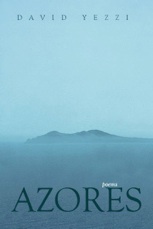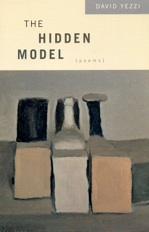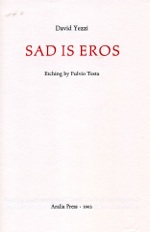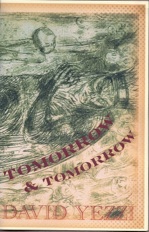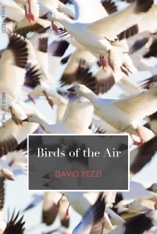david yezzi
Birds of the Air was published by Carnegie Mellon University Press in March 2013. Available on Amazon.com.
The chapbook Tomorrow & Tomorrow, a dramatic poem for two voices, with an afterword by Denis Donoghue, is available from Exot Books.
Praise for Birds of the Air:
Early on in “Birds of the Air” readers may think of Timothy Steele and his mentor, J. V. Cunningham. The chiseled, witty, objective poem “Crane” begins, “Paper creased is / with a touch / made less by half, / reduced as much,” then adds three more rhymed quatrains in two-beat lines. Turn the page, and the title poem — a description of sea gulls in rhyming quatrains of longer lines — also reflects Steele’s influence. But Yezzi, the executive editor of The New Criterion, embraces a span of tones, subjects and styles: cutting humor (“Cough”); elegies (for Tom Disch and Rachel Wetzsteon); satire and self-irony (“High to Low”); personal love poems (“This Is My Proof”); light verse (“Pals”); even, in “Flatirons,” five Shakespearean sonnets about rock-climbing and the sublime, the last one closed expressively on a slant rhyme and an artful departure from the iambic norm when we’re at the top, “more insubstantial than a drinking song, / and marked by sandstone long after we’re gone.” Equally impressive are the blank-verse monologues “Spoils,” “Schnauzer” and “Tomorrow & Tomorrow,” the speakers ranging from a thief cleaning out a dying man’s home to a dog-owning abductor and a failed actor. Here Yezzi’s inventive ventriloquism convincingly modulates his rhythms, recording natural speech in measured lines: “Her teeth were too big and a bit off-center / in a way that made me always want to kiss her.” Not yet 50, Yezzi ranks among our best formalists.
—Matthew Brennan, The New York Times Book Review
Sad and serious, attentive to meter and balance yet no slave to form, the dramatic monologues, rough laments, strict rhymes and accomplished syllabics in this third volume from Yezzi (Azores) go far beyond expectations: it should impress not just those who follow “formal” poetry generally, but almost anyone who has an abiding love for the poetry of Robert Frost. Executive editor of the New Criterion, Yezzi draws carefully on the non- and pre-modernist past: what he adds is, sometimes, a caustic sadness peculiar to his generation, a sense of nothing left, as in a poem on an old photograph: “The scribble across/ the back, your name—/ if more was meant,/ it never came.” Failed romance, disconsolate Eros, provides a ground note for a volume that also observes urban privilege and the urban poor, though it keeps coming back to the poet’s own Larkinesque, or perhaps Frostian, failures: “We are as useless as an open lock,/ more insubstantial than a drinking song.” Yet Yezzi’s greatest ambition arrives instead in dramatic and narrative verse, especially in the four-part, two-voice, 16-page “Tomorrow & Tomorrow,” in which a 20-something writer and actor loses his girlfriend while touring Europe in Macbeth: “Of course, there’s things that won’t let you forget/ how what you wanted is what hurt you most,/ how it was happiness itself betrayed you.”
—Publishers Weekly, starred review & PW pick
Yezzi is equally good with a naturalistic verse monologue, with high ridiculousness or high seriousness, and also with the most gratifyingly low light verse. But the mode in which he's probably most distinguished among contemporary poets is dramatic verse, which seems to be forgotten in the U.S., maybe because people believe verse is too formal to accommodate natural speech rhythms. But Yezzi gives the lie to this idea with his superb sense of rhythm, phrasing, diction, timing, and syntax, with his special skill at characterization, and with deep sensitivity to real speech. He brings these gifts to his lyrics as well, in a way that challenges the limitations of the contemporary autobiographical poem.
—Joshua Mehigan
Severe grace and elegiac intensity inform the deft lyrics throughout but particularly “Tomorrow & Tomorrow.” Somber and replete with an elegant pathos, this travesty of Macbeth lingers in my mind after the second reading.
—Harold Bloom
“As sandstone ends, the world of ghosts begins”: David Yezzi’s poems— these vivid remembrances of things past, these depictions of “the mess that’s me” — are essentially short stories, tales of naughtiness in nursing homes, of the griddle wizardry of short-order cooks, of a love affair wrecked by a second-rate production of Macbeth. While Yezzi’s verse may be formal and polished, his voice is always intimate, often slangy, and extraordinarily confiding. “It must give pleasure,” said Wallace Stevens, and David Yezzi’s Birds of the Air does that, again and again and again.
—Michael Dirda
The title poem of David Yezzi’s book is charming, and the narratives that follow give repeated pleasure by their rough vigor of form and language.
—Richard Wilbur
Praise for Azores (2008):
“Yezzi finds a way to write about relationships not found much in poetry, the iffy connections with acquaintances, couples, and places, cemented with convenience and jealousy as well as fondness. Romance will always have the limelight, but I think Yezzi’s tacit statement is correct, that these shallower relationships, failing in droves, contribute the bulk of the sadness to life.”
Poetry
“Azores is not merely an impressive collection, although it is that. It also serves as a pleasing reminder that there are poets still writing for whom the responsibility of expression outweighs the desire to be regarded as shamanic.... [I]t is pleasing and useful to have a poet writing with controlled rigor about important themes.”
Contemporary Poetry Review
“It is this breeching, this inability to exist in one mode that makes Azores such a valuable collection of work. Not content to merely model our divided humanity, the structure of Yezzi’s poems is amphibious – this is a formal collection that doesn’t read formally.... Buy this book, read these poems, and let them ask you where change lives. Wrestle with their words for the answer.”
Strong Verse
“Intelligent and moving, David Yezzi‘s Azores relies on understatement, humor, and masterful control of tone. Proficient and inventive in traditional forms, this poet speaks in an ironic, compassionate voice, his dark vision reminiscent of Frost at his most tender.”
The Antioch Review
“The new book of poetry that gave me the most pleasure this year is Azores, by David Yezzi. Yezzi writes with insight and elegance about the lives we actually lead—about the ironic balance between violent feeling and regulated behavior that defines adulthood.”
Adam Kirsch, Slate
“What a beautiful book...redolent of Larkin, of Thom Gunn. That fierce eye, fierce and formal control.”
No Tell poetry blog
“The sophistication of Mr. Yezzi’s language perfectly suits the sophistication of his understanding, and some of the poems in Azores—“Very Like a Whale,” “Dog’s Life,” the brilliant and unexpected dramatic monologue “The Ghost-Seer”—display a mastery reminiscent of Philip Larkin and Donald Justice, which no poet of Mr. Yezzi’s generation can match.”
The New York Sun
“Yezzi’s vocabulary and diction are entirely contemporary; his meters and forms are traditional.... Altogether, for versatility and craft, he’s a new, necessarily less jingly Longfellow.”
Booklist
Praise for The Hidden Model (2003)
“Yezzi brings together beauty and skepticism, eloquence and doubt, the visual and the verbal. Reading him reminds us that poetry is capable of the most subtle perception and the most civilized thought.”
Adam Kirsch, Contemporary Poetry Review
“[Yezzi’s] elements are water and earth—locality, gravity and mortality—and with them he has made some durable poems.”
Stephen Burt, The New York Times Book Review
“A first collection of unusual poise, The Hidden Model is rich in rewards. The poet’s emotional and visual acuity is striking.”
Jane Satterfield, The Antioch Review
“[A] polished, intellectually intriguing, and emotionally precise collection, whose forms and themes are complex, subtle collaborators.”
Adam L. Dressler, Parnassus: Poetry in Review
